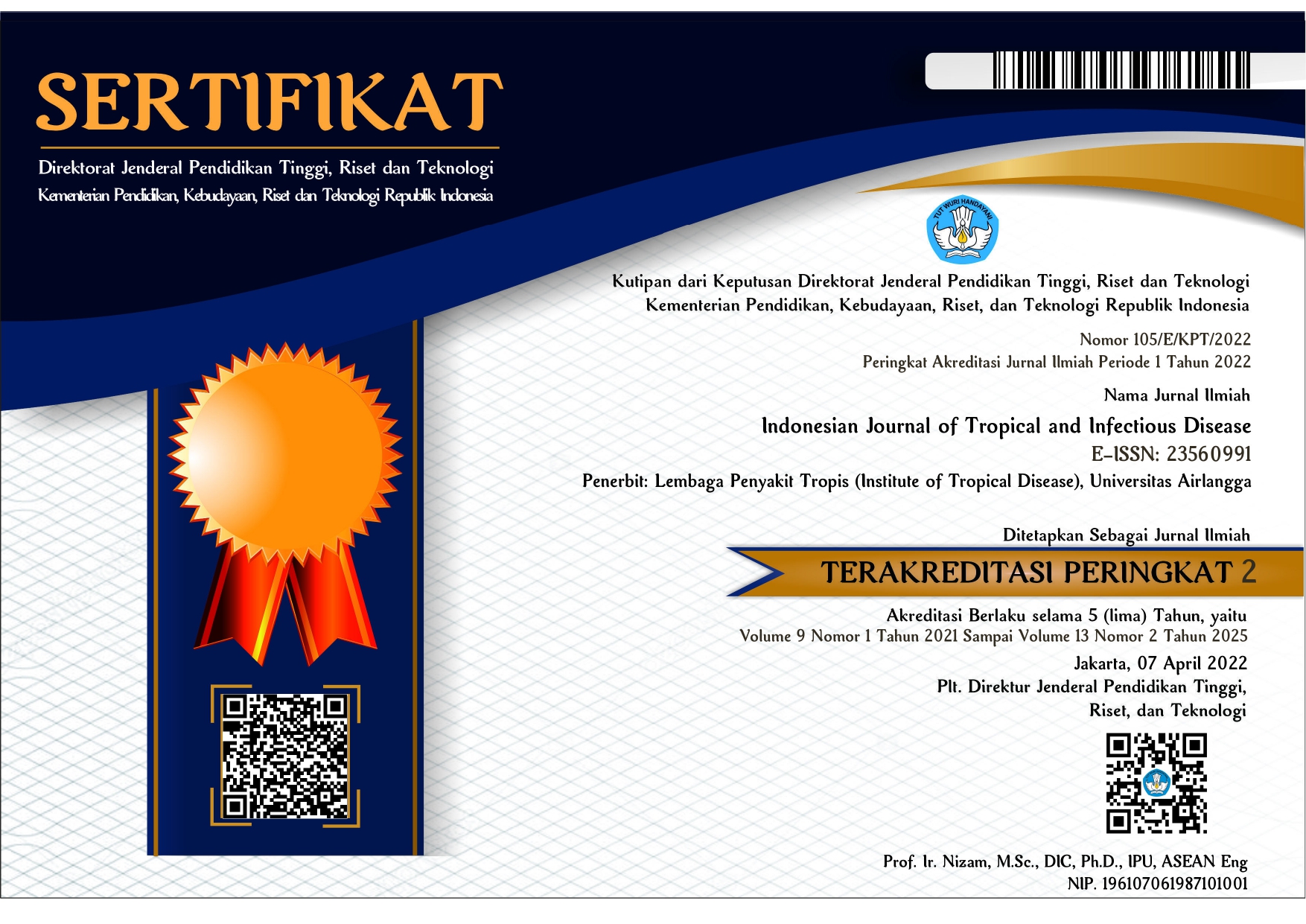PROGNOSTIC FACTORS OF SEVERE DENGUE INFECTIONS IN CHILDREN
Downloads
WHO. Dengue, guidelines for diagnosis, treatment, prevention and control. Genewa. 2009:1-160.
Karyanti MR, Kusriastuti R, Hadinegoro SR, Rovers MM, Heesterbeek H, Hoes AW, et al. The changing incidence of dengue haemorrhagic fever in Indonesia: a 45-year registry-based analysis. BMC Infect Dis. 2014;26:1-7.
Simons CP, Farrar JJ, Chau NV, Wills B. Dengue. N Engl J Med 2012;366:1423-32.
Whitehorn J, Simmons CP. The pathogenesis of dengue. Vaccine. 2011;29(42):7221-8.
Gutierrez G, Gresh L, Petrez MA, Elizondo D, Aviles W and Kuan G, et al. Evaluation of the diagnostic utility of the traditional and revised WHO dengue case definitions. Plos Negl Trop Dis. 2013;7:e2385.
John DV, Lin YS, Guey Perng GC. Biomarkers of severe dengue disease – a review. J Biomed Sci. 2015;22:83
Nguyen MT, Nguyen VV, Nguyen TH, Ho TN, Ha MT and Ta VT , et al. An evidence-based algorithm for early prognosis of severe dengue in the outpatient setting. Clin Infect Dis. 2017 Mar 1;64(5):656-63.
Potts JA, Gibbon RV, Rothman AL, Srikiatkhachorn A, Thomas SJ, Supradish PO et al. Prediction of dengue disease severity among pediatric Thai patients using early clinical laboratory indicators. Plos One Negl Trop Dis. 2010 August 3;4(8):e769.
Tuan NM, Nhan HT Chau NV, Hung NT, Tuan HM, Tram TV, et al. Sensitivity and specificity of a novel classifier for the early diagnosis of dengue. Plos Negl Trop Dis. 2015 Apr 2; 9(4):e0003638.
Pongpan S, Wisitong A, Tawichasri C, Patumond J, Namwongprom S. Development of Dengue Infection Severity Score. ISRN Pediatrics, 2013;2(1):12-8.
Marón GM, Clará W, Diddle JW, Pleités EB, Miller L, Macdonald G, Adderson EE. et al. Association between Nutritional Status and Severity of Dengue Infection in Children in El Salvador. Am J Trop Med Hyg. 2010 Feb ;82(2):324–9
Yulianto A, Laksono IS, Juffri M. Faktor prognosis derajat keparahan infeksi dengue. Sari Pediatri. 2016;18(3):198-203.
Ledika MA, Setiabudi D, Dhamayanti M. Association between clinical profiles and severe dengue iInfection in children in developing country. American Journal Epidemiology and Infectious Disease. 2015;3(3):45-9.
Trang NTHT, Long NP, Hue TTM, Hung LP, Trung TD , Dinh DN, et al. Association between nutritional status and dengue infection: a systematic review and meta-analysis. BMC Infec Dis. 2016 Apr 20;16:172.
Zulkipli MS, Dahlui M, Jamil N, Wai HVC, Bulgiba A, Rampai S, et al.The association between obesity and dengue severity among pediatric patients: A systematic review and metanalysis. Plos Negl Trop Dis. 2018 Feb 7;12(2):1-22.
Tan VPK, Ngim CF, Lee EZ, Ramadas A, Pong LY , Hassan SY, et al. The association between obesity and dengue virus (DENV) infection in hospitalised patients. Plos One. 2018 Jul 17; 13(7): e0200698.
Bandaru P RH, Nappanveettil G. The Impact of Obesity on Immune Response to Infection, Vaccine: An Insight into Plausible Mechanisms. Endocrinol Metab Synd. 2013; 2(113).
Prathyusha CV, Rao MS, Sudarsini P, Rao KUM. Clinico-haematological profile and outcome of dengue fever in children. Int J Curr Microbiol App Sci. 2013;2(10):338-46.
Mishra S, Ramanathan R, Agarwalla S. Clinical Profile of Dengue Fever in Children: A Study from Southern Odisha, India. Scientiï¬ca. 2016:1-6.
Vuong NL, Manh DH, Mai NT, Phuc LH, Luong VT, Quan VD et al. Criteria of "persistent vomiting” in the WHO 2009 warning signs for dengue case classification. 2016;44:14
Zhang H, Zou YP, Peng HJ, Zhang XH, Zhou FY, Liu ZH, Chen GX. Predictive symptoms and signs of severe dengue disease for patients with dengue fever: a meta-analysis. Biomed Research Int. 2014 July1;1-10.
Gupta BK, Nehera HR, Parmar S, Meena SL, Gajraj S et al. Acute abdomen presentation in dengue fever during recent outbreak. J acute Disease. 2017;6(5):198-204.
Sabbir B, Qadir H, Shafi F, Mahboob F. Acute abdominal pain in Dengue Fever. PJMHS. 2012;6:155-8.
Branco MD, Luna EJ, Braga Junior LL, Oliviera RV, Rios LT, Silva MD et al. Risk factors associated with death in Brazilian children with severe dengue: a case-control study. Clinics. 2014;69(1):55-60.
Ho TS, Wang SM, Lin YS, Liu CC. Clinical and predictive markers for acute for dengue infection. J Biomed Science. 2013;20:75.
Jagadishkumar K; Jain P, Manjunath VG, Umesh L. Hepatic involvement in dengue fever in children. Iran J Pediatr. 2011; 22(2):231-6.
Roy A, Sarkar D, Chakraborty S, Chaudhuri J, Ghosh P, Chakraborty S. Profile of hepatic involvement by dengue virus in dengue infected children. N Am J Med Sci. 2013; 5(8):480-5.
Samanta J, Sharma V. Dengue and its effect in liver. World J Clin Cases. 2016 Feb 16;3(2):125-31.
WHO. Comprehensive guideline for prevention dan control dengue and dengue hemorrhagic fever. New Delhi: WHO, 2011.pp.1-212.
Pagliari C, Quaresma JA, Fernandes ER., Stegun FW, Brasil RA, de Andrade Jr HF, et al. Immunopathogenesis of dengue hemorrhagic fever: contribution to the study of human liver lesions. J. Med. Virol. 2014;86:1193–7.
Ferreira RA, de Oliveira SA, Gandini M et al. Circulating cytokines and chemokines associated with plasma leakage and hepatic dysfunction in Brazilian children with dengue fever. Acta Trop. 2015;149:138–47.
Suwarto S, Nainggolan L, Sinto R, Effendi B, Ibrahim E, Suryamin M, R. Sasmono T. Dengue score: a proposed diagnostic predictor for pleural effusion and/or ascites in adults with dengue infection. BMC Infectious Diseases (2016) 16:322.
Pone SH, Hokerberg YHM, De Oliviera R, Daumas RP, Pone TM, da Silva Pone MV, Brasil P, et al. Clinical and laboratory signs associated to serious dengue disease in hospitalized childre. J Pediatr (Rio J). 2016;92(5):464-471.
Elling R, Henneke P, Hatz C, Hufnagal M. Dengue fever in children: where are we now? Pediatr Infect Dis J. 2013;32:1020-2.
Lei HY, Huang KJ, Lin YS, Liu HS, Liu CC. Immunopathogenesis of dengue hemorrhagic fever. Am J Infect Dis. 2008;4:1-9.
Chuang YC, Lin YS, Liu CC, et al. Factors contributing to the disturbance of coagulation and fibrinolysis in dengue virus infection. J Formos Med Assoc. 2012;112(1):12-7.
Budastra IN, Arhana BNP, Mudita IB. Plasma prothrombin time and activated partial thromboplastin time as predictors of bleeding manifestation during dengue hemorrhagic fever. Paediatr Indones. 2009;49(2):69-74.
Chuang YC, Lin YS, Liu HS, Yeh TM. Molecular Mimicry between Dengue Virus and Coagulation Factors Induces Antibodies To Inhibit Thrombin Activity and Enhance Fibrinolysis. J Virol. 2014 ;88(23): 13759–68.
Lee LK, Gan VC, Lee VJ, Tan AS, Leo YS, Lye DC et al. Clinical relevance and discriminatory value of elevated liver aminotransferase levels for dengue severity. Plos One. 20126(6):1676.
Fernando S, Wijewickrama A, Gomes L, Punchihewa CT, Madusanka SD, Dissanayake H, et al. Patterns and causes of liver involvement in acute dengue infection. BMC Infect Dis. 2016 16:319.
World Health Organization, Global strategy for dengue prevention and control 2012-2020. Geneva, Switzerland, 2012
Chanprasopcha P, Pongsumpu P, Ming Tang I. Effect of Rainfall for the Dynamical Transmission Model of the Dengue Disease in Thailand. Comput Math Methods in Med. 2017 August 8:1-17
Copyright (c) 2020 Indonesian Journal of Tropical and Infectious Disease

This work is licensed under a Creative Commons Attribution-NonCommercial-ShareAlike 4.0 International License.
The Indonesian Journal of Tropical and Infectious Disease (IJTID) is a scientific peer-reviewed journal freely available to be accessed, downloaded, and used for research. All articles published in the IJTID are licensed under the Creative Commons Attribution-NonCommercial-ShareAlike 4.0 International License, which is under the following terms:
Attribution ” You must give appropriate credit, link to the license, and indicate if changes were made. You may do so reasonably, but not in any way that suggests the licensor endorses you or your use.
NonCommercial ” You may not use the material for commercial purposes.
ShareAlike ” If you remix, transform, or build upon the material, you must distribute your contributions under the same license as the original.
No additional restrictions ” You may not apply legal terms or technological measures that legally restrict others from doing anything the license permits.























